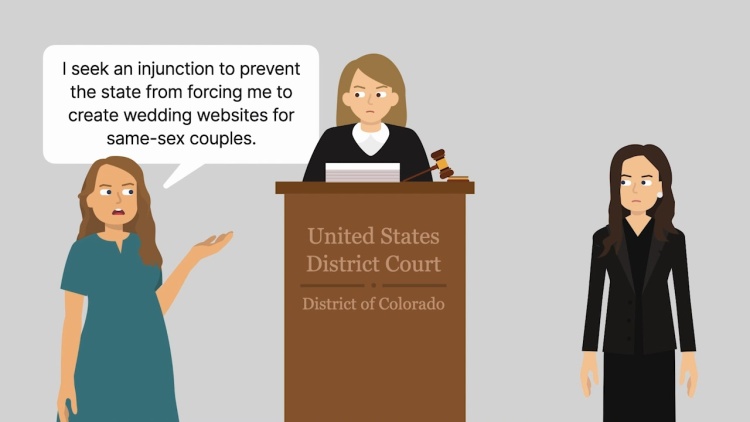303 Creative LLC v. Elenis
United States Supreme Court
600 U.S. 570, 143 S. Ct. 2298, 216 L. Ed. 2D 1131 (2023)
- Written by Abby Roughton, JD
Facts
Website designer Lorie Smith owned 303 Creative LLC (plaintiff), a Colorado-based website-and-graphic-design business. Smith wanted to begin offering wedding-website services through 303 Creative. However, Smith believed that marriage was reserved for heterosexual couples and thus did not want to create wedding websites for same-sex couples. Smith was concerned that if 303 Creative began offering wedding-website-design services, Smith would be forced to create wedding websites that were inconsistent with her beliefs because of the Colorado Anti-Discrimination Act (CADA), which prohibited businesses from engaging in discrimination in the sale of goods and services to the public. Potential penalties for violating CADA included mandatory training and monetary fines. Smith brought an action in federal district court against Colorado Civil Rights Division Director Aubrey Elenis and other state officials (collectively, the state) (defendants), seeking an injunction prohibiting the state from forcing Smith to create wedding websites for same-sex couples. Smith and the officials stipulated, among other things, that (1) 303 Creative’s graphic-design and website-design services were expressive in nature and involved Smith’s creation of original, customized designs that conveyed messages celebrating and promoting marriage; (2) website viewers would know that the websites were original artwork created by Smith and 303 Creative; (3) Smith’s beliefs about marriage were a sincerely held religious conviction; and (4) Smith refused to produce content that contradicted biblical truth. The district court ultimately granted summary judgment for the state, and the Tenth Circuit affirmed. The Tenth Circuit said that Smith’s potential wedding websites were pure speech protected by the First Amendment. However, the court reasoned that Colorado had a compelling interest in ensuring equality in the provision of goods and services to the public and that goal could not be achieved by a less restrictive alternative than compelling Smith to create websites for all customers. The United States Supreme Court granted certiorari.
Rule of Law
Issue
Holding and Reasoning (Gorsuch, J.)
Dissent (Sotomayor, J.)
What to do next…
Here's why 908,000 law students have relied on our case briefs:
- Written by law professors and practitioners, not other law students. 47,100 briefs, keyed to 997 casebooks. Top-notch customer support.
- The right amount of information, includes the facts, issues, rule of law, holding and reasoning, and any concurrences and dissents.
- Access in your classes, works on your mobile and tablet. Massive library of related video lessons and high quality multiple-choice questions.
- Easy to use, uniform format for every case brief. Written in plain English, not in legalese. Our briefs summarize and simplify; they don’t just repeat the court’s language.





